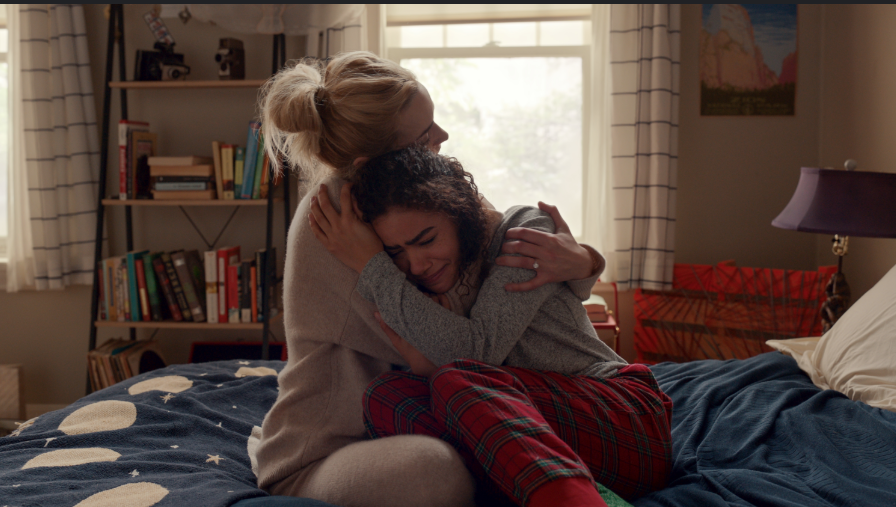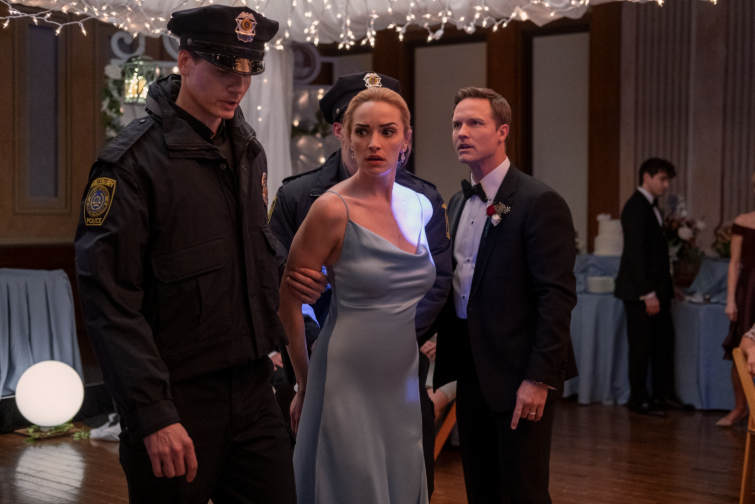By Penny Theodorakopoulou,
The Netflix series Ginny & Georgia (2021 – ) skillfully tells a tale of secrets, family, and the difficult obstacles of growing up. The show captivates us with its brutally honest depiction of ordinary life, a life distinguished as much by beauty as by adversity, rather than depending just on wild plot twists or dramatic tales. Instead of being a story about superhuman feats, this is a raw, character-driven journey that illustrates how unpredictable growing up can be and how far a parent will go to keep their child safe.
The two main characters of the series are Georgia and her daughter Ginny. Georgia, a young mother, has a history of adversity and a premature loss of innocence. After overcoming a difficult upbringing and becoming pregnant at the age of 15, she is committed to giving her kids a brighter future. Resilience and a readiness to undertake ethically dubious decisions to give her children a chance at happiness are qualities that define her character. Unquestionably, Georgia is complex — a protective instinct tinged with peril and desperation, highlighted by her unwavering quest for a life free from the baggage of her own past.
Ginny, on the other hand, stands for the turbulent, erratic nature of puberty. She is the epitome of the typical high school girl: impetuous, very sentimental, and yet figuring out friendships and early romantic relationships. Anyone who has ever felt overwhelmed by the intensity of growing up can relate greatly to Ginny’s challenges, both with her relationships and with the fallout from her impulsive decisions. She experiences the exhilarating heights and heartbreaking lows of adolescence, just like the characters in HBO’s Euphoria (2019 – ). But despite these obvious parallels, Ginny & Georgia creates its own special kind of drama by skillfully fusing Ginny’s personal struggles with the larger, more complex story of her mother’s past.

The series’ utilization of multiple parallel plotlines to examine complex, emotionally sensitive subjects is among its most captivating features. Ginny’s impetuous actions are more than just a plot device; they are a true representation of the mayhem that frequently accompanies adolescence. She portrays her self-destructive tendencies with terrible sincerity, including instances in which she burns herself to injure herself. These moments serve more than just shock value; they highlight the deep sense of loneliness and despair that can arise when a young person feels lost and unsupported. In this sense, the series, like Euphoria, does not hold back from delving into the murky depths of despair and self-harm, but it does it in a unique, sympathetic manner.
The show’s deft analysis of these issues through monologues and reflective periods is equally remarkable. In moving soliloquies, the characters’ innermost thoughts are revealed, allowing the audience to temporarily put themselves in their shoes. The characters’ inner conflicts are revealed to us through these introspective pauses, which offer a peek of the quiet conflicts waged out of sight. In addition to enhancing the viewing experience, this narrative approach forges a very intimate bond between the viewer and the characters. It appears as though the screen turns into a confessional booth where people can reveal their flaws and exchange secrets.
Even with these serious subjects, Ginny & Georgia finds a way to blend humor with drama. The show recognizes that there are other aspects of life besides sadness, particularly in adolescence. There are brief moments of hope, bursts of comedy, and the unwavering love that keeps family members together under the most trying circumstances. Anyone who has ever sought comfort in knowing they are not alone in their troubles will be able to relate to this combination of brightness and darkness, which makes even the most agonizing situations feel therapeutic.

Ginny & Georgia‘s narrative structure and tempo make sure that nothing seems unduly forced. The series does contain a few noteworthy story twists, but they never overpower the more subdued, personal aspects that serve as its central theme. Rather, these turns work as punctuation in a narrative that is primarily fueled by the development of characters and interpersonal relationships. On the surface, this strategy would appear like Euphoria, a show renowned for its harsh, uncompromising examination of modern teen difficulties; yet Ginny & Georgia sets itself apart by deftly fusing the past with the present. Ginny’s path of self-discovery is linked with Georgia’s own experience —her regrets, her sacrifices, and her unwavering resolve to end the cycle of pain— to create a complex and genuine story.
There is no denying the series’ emotional impact. As the episodes captivate you, it’s easy to lose track of time, and viewers frequently wake up in the wee hours of the morning with strong feelings. Many viewers have been moved to tears by the unvarnished depiction of suffering, love, and resiliency, and they have found themselves halting shows to catch their breath because of how intense the characters’ experiences are. In this sense, the series functions as a mirror reflecting the frequently jumbled truth of human emotion in addition to providing amusement. It pushes us to face the more difficult parts of our own life and acknowledge that beauty and hope can frequently be found even in the middle of chaos.
Although the series excels in character development and emotional depth, its conclusion leaves us feeling uneasy. As intriguing as it is tempting, the cliffhanger climax has fans debating and discussing what might happen next. There are two sides to this open-ended ending: it increases interest in a possible future season while also allowing viewers to solve the remaining puzzles on their own.

Ultimately, Ginny & Georgia is a show for people who don’t mind facing life’s harsher aspects. It is not a story for the weak; viewers must be resilient to handle its unvarnished, unadulterated examination of despair, self-harm, and the chaotic reality of adolescence. However, the series delivers more than simply a story; it is an emotional journey that stays with viewers long after the credits have rolled, for those who are prepared to delve deeply and wrestle with these ideas. Yes, it has its many, many cringe moments; but this is a must-watch experience for those who can handle the gloomy content; it promises to both engage and question ideas about what it means to grow up in a world full of suffering and the possibility of redemption.
The series, which examines the entwined lives of Georgia and Ginny, serves as a reminder that despite the uncertainties of the future and the shadows of our history, there is an unwavering drive to find light, even if it is only in the little intervals between the dark. Of all the stories, that one might be the most relatable.
References
- Ginny & Georgia review – such perfect trash deserves a special award. theguardian.com. Available here
- Ginny & Georgia Is So, So Much. Truly, So Much. vulture.com. Available here
- “Ginny and Georgia”: A Formerly Biased Review. theweathervane.org. Available here
- TV Review: Ginny & Georgia. nshmessenger.com. Available here
- Ginny & Georgia is ….. really good. reddit.com. Available here
- ‘Ginny & Georgia’ Showrunner on Season 2’s Shocking Finale, Mental Health Representation and Season 3 Hopes. hollywoodreporter.com. Available here




